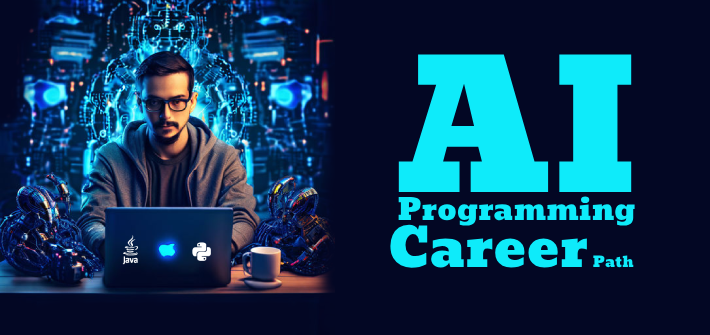The field of artificial intelligence (AI) is rapidly evolving, creating a high demand for skilled AI programmers. Therefore, if you’re considering a career in AI programming, it’s essential to understand the required skills, the educational path, and practical tips to get started. This comprehensive guide will help you navigate the AI programming career path and equip you with the knowledge needed to succeed.
Table of Contents
Understanding the AI Programming Career Path
What is AI Programming?
AI programming involves creating algorithms and models that enable machines to perform tasks that typically require human intelligence. Moreover, this includes problem-solving, decision-making, language understanding, and perception. AI programmers work on developing systems that can learn from data, adapt to new inputs, and improve over time.
Key Roles in AI Programming
Machine Learning Engineer
A Machine Learning Engineer focuses on designing and implementing machine learning algorithms. They work with large datasets and use various techniques to train models. Additionally, these engineers are responsible for optimizing models to improve their performance and accuracy. By employing methods such as supervised and unsupervised learning, they ensure the development of robust AI applications.
Deep Learning Engineer
A Deep Learning Engineer specializes in neural networks and deep learning models. These professionals are responsible for developing advanced AI systems, particularly for tasks such as image and speech recognition. Furthermore, they experiment with different architectures to enhance model capabilities and efficiency. Deep Learning Engineers play a crucial role in pushing the boundaries of what AI can achieve in various fields, from healthcare to autonomous vehicles.
Data Scientist for AI
A Data Scientist for AI analyzes and interprets complex data to create actionable insights. Data scientists often work closely with AI programmers to develop and deploy AI models. Moreover, they utilize statistical methods and data visualization techniques to inform decision-making processes. Their collaboration with other AI specialists ensures that the models are not only accurate but also practical and aligned with business goals.

Essential Skills for AI Programmers
To pursue a career in AI programming, you need a solid foundation in several key areas:
1. Programming Languages for AI
Proficiency in programming languages is crucial for AI programming. the most commonly used languages in AI include:
- Python: Widely used for its simplicity and extensive libraries like TensorFlow, Keras, and PyTorch.
- R: Popular for statistical analysis and data visualization.
- Java: Often used in large-scale enterprise-level applications.
- C++: Known for its performance and efficiency, particularly in real-time systems.
2. Mathematics for AI
A strong understanding of mathematics is essential for AI programming. Key areas include:
- Linear Algebra: Used for manipulating matrices and vectors, fundamental in machine learning algorithms.
- Calculus: Essential for understanding optimization and training of AI models.
- Probability and Statistics: Important for data analysis and model evaluation.
3. Machine Learning and Deep Learning
knowledge of machine learning and deep learning concepts is vital. This includes understanding:
- Supervised and Unsupervised Learning: These are methods for training models. Supervised learning uses labeled data, while unsupervised learning works with unlabeled data to find patterns.
- Neural Networks: Understanding the structure and training of artificial neural networks is crucial. These networks mimic the human brain with layers of neurons, thereby enabling tasks such as image and speech recognition.
- Deep Learning Frameworks: Familiarity with frameworks like TensorFlow and PyTorch is essential. These tools not only simplify the development and deployment of deep learning models but also establish industry standards.
4. Data Science for AI
This skills are critical for AI programmers, including several essential areas:
Data Cleaning and Preprocessing
First, preparing data for analysis is crucial. This involves cleaning the data to remove any inaccuracies or inconsistencies, which ensures the dataset is reliable for further analysis. Preprocessing steps, such as normalization and scaling, also help improve the quality of the input data.
Feature Engineering
Next, selecting and transforming variables for modeling is a key step. Subsequently, feature engineering involves identifying the most relevant features from raw data and creating new features that can enhance model performance. This process often requires domain knowledge and creativity to extract meaningful patterns from the data.
Model Evaluation
Finally, assessing the performance of AI models using various metrics is essential. Model evaluation helps determine how well the model generalizes to new data. Common metrics include accuracy, precision, recall, and F1 score. This step ensures that the model meets the desired performance criteria before deployment.

Educational Path for AI Programming
1. Formal Education
A bachelor’s degree in computer science, engineering, mathematics, or a related field is typically required for entry-level positions in AI programming. Many professionals also pursue advanced degrees (Master’s or Ph.D.) specializing in AI or machine learning.
2. Online Courses and Certifications
There are numerous online courses and certifications available that focus on AI programming. For instance, popular platforms include Coursera, edX, Udacity, and Khan Academy. These courses typically cover the fundamentals of AI, machine learning, and deep learning.
3. Bootcamps and Workshops
Attending AI bootcamps and workshops can provide hands-on experience and networking opportunities. Moreover, these intensive programs are designed to equip you with practical skills in a short amount of time.
Tips to Get Started in AI Programming
1. Build a Strong Foundation in Programming and Mathematics
Start by mastering programming languages like Python and gaining a solid understanding of mathematical concepts. Additionally, practice solving problems on platforms like LeetCode and HackerRank to enhance your coding skills.
2. Learn from Online Resources
Take advantage of online courses, tutorials, and articles. Websites such as Coursera, edX, and Khan Academy offer comprehensive courses on AI and machine learning.
3. Work on Real-World Projects
Gain practical experience by working on real-world projects. Participate in Kaggle competitions, contribute to open-source AI projects, or create your own projects to showcase your skills.
4. Stay Updated with the Latest Trends
AI is a rapidly evolving field. Stay updated with the latest research papers, industry news, and advancements in AI technology. Follow AI conferences and join online communities to network with other professionals.
5. Gain Practical Experience through Internships
Internships provide valuable hands-on experience and can lead to job opportunities. Therefore, look for internships at tech companies, research institutions, or startups focused on AI.
6. Build a Strong Portfolio
Create a portfolio that showcases your AI projects, including code samples, project descriptions, and results. This comprehensive portfolio can significantly enhance your visibility and attractiveness to potential employers.
7. Seek Mentorship and Networking Opportunities
Connect with experienced AI professionals through networking events, online forums, and LinkedIn. Additionally, mentors can provide crucial guidance, feedback, and support as you progress in your career.
8. Pursue Advanced Degrees and Certifications
Consider pursuing a master’s degree or Ph.D. in AI or machine learning to deepen your knowledge and increase your job prospects. Additionally, obtaining certifications from reputable organizations can enhance your credibility.
Conclusion
Embarking on an AI programming career path requires dedication. Moreover, continuous learning and a strong foundation in programming, mathematics, and machine learning concepts are essential. By following the steps outlined in this guide and leveraging available resources, you can develop the skills needed to succeed in this exciting and rapidly growing field. Stay curious, keep learning, and embrace the challenges and opportunities that come with a career in AI programming.



